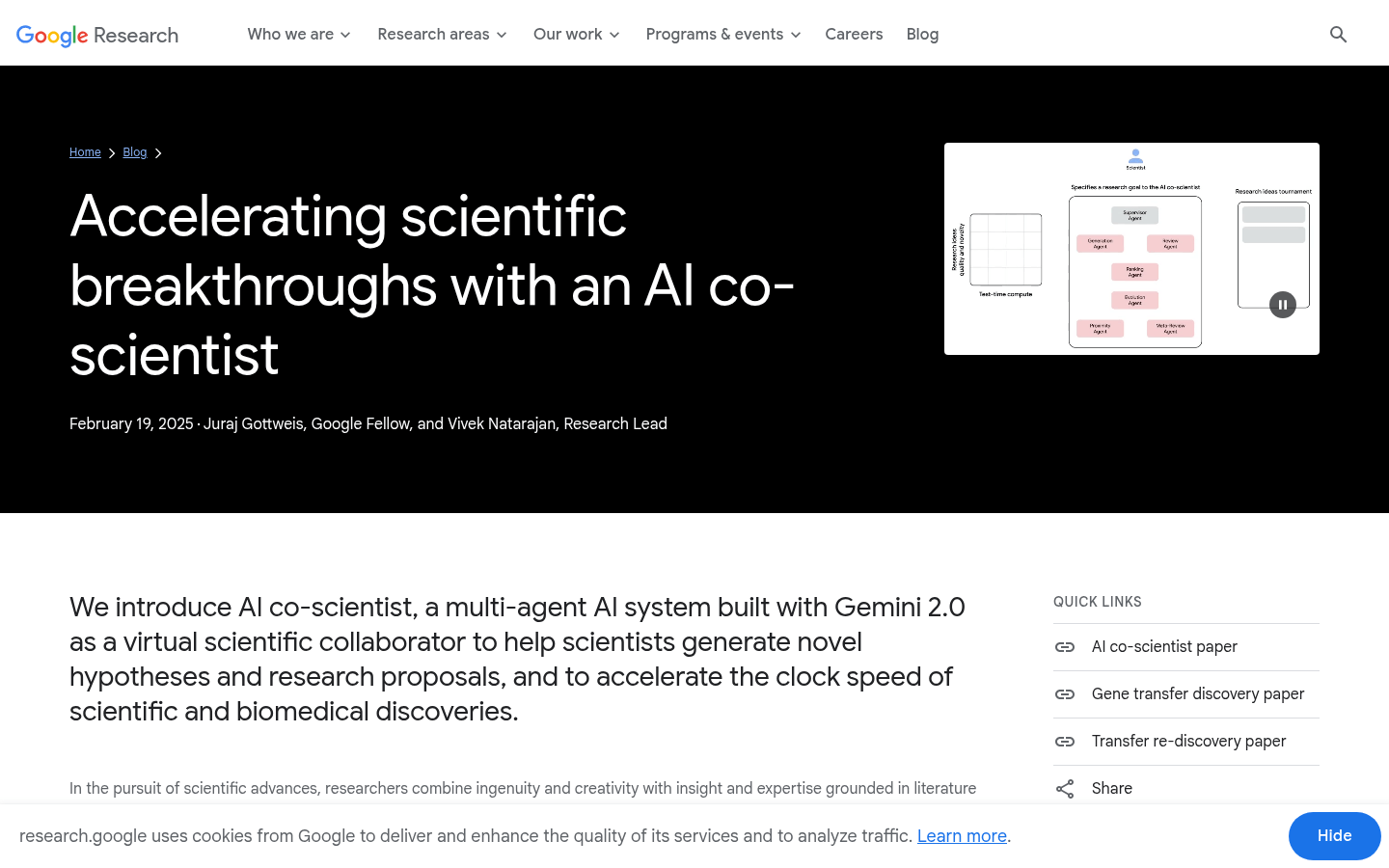

AI Co Scientist
Overview :
AI Co-scientist is a multi-agent AI system developed by Google Research to assist scientific research through artificial intelligence techniques. Built on Gemini 2.0, the system simulates the reasoning process of scientific methods, generating new research hypotheses and experimental plans. Through multi-agent collaboration, utilizing mechanisms such as generation, reflection, ranking, and evolution, it continuously optimizes its output. The main advantages of AI Co-scientist include the efficient generation of novel scientific hypotheses, strong interdisciplinary knowledge integration capabilities, and collaborative capabilities with scientists. Currently in the research phase, the system is being validated for its application potential in fields like biomedicine through partnerships with leading global research institutions.
Target Users :
This product is primarily designed for research scientists, particularly those in fundamental science fields like biomedicine, chemistry, and physics. It helps them rapidly generate new research directions and experimental designs, reduce literature review time, and accelerate the pace of scientific discovery. For interdisciplinary research teams, AI Co-scientist integrates knowledge from different areas, providing a more comprehensive research perspective.
Use Cases
In drug repurposing research for acute myeloid leukemia (AML), AI Co-scientist proposed new drug candidate options and validated their effectiveness through experiments.
In the discovery of therapeutic targets for liver fibrosis, AI Co-scientist suggested epigenetic targets with anti-fibrotic activity and validated their effects in human liver organoids.
In antibiotic resistance research, AI Co-scientist independently proposed a new gene transfer mechanism, consistent with laboratory experimental results.
Features
Generates novel research hypotheses and experimental protocols, helping scientists explore uncharted territories.
Optimizes hypothesis quality through multi-agent collaboration, utilizing mechanisms such as generation, reflection, and ranking.
Supports scientists through natural language interaction, providing feedback or seed ideas.
Leverages the powerful language capabilities of Gemini 2.0 to integrate interdisciplinary knowledge.
Demonstrates its practical application value in the biomedical field through experimental validation.
How to Use
1. Define Research Objective: Scientists describe their research goal using natural language, for instance, 'Explore new drug repurposing opportunities for acute myeloid leukemia.'
2. Input to System: The research objective is input into the AI Co-scientist system, which automatically analyzes it and generates a research plan.
3. Generate Hypotheses: The system generates multiple novel research hypotheses and experimental protocols through multi-agent collaboration.
4. Evaluate and Provide Feedback: Scientists evaluate the generated hypotheses and provide feedback, enabling the system to further refine them.
5. Experimental Validation: The optimized hypotheses are translated into experimental protocols and validated in the laboratory.
Featured AI Tools

Scholarcy
Scholarcy is an online literature summarization tool that can generate summary cards for lengthy articles. It reads through research articles, reports, and book chapters, breaking them down into easily understandable segments in seconds to help users quickly assess the relevance of any literature to their work. It extracts key information such as research participants, data analysis, main findings, and limitations, transforming them into summary cards. Scholarcy can also extract charts and images from literature and create links to open the source references. Users can integrate Scholarcy's browser extension with open-access libraries and build their personal summarization research library through the paid subscription service Scholarcy Library.
Research equipment
113.7K

Starfire Research Assistant
Starfire Research Assistant, jointly developed by iFlytek and the Institute of Information Resources, Chinese Academy of Sciences, is an AI research assistant. Based on cognitive intelligence large models and massive scientific literature resources, it provides functions such as research achievement investigation, paper reading, and academic writing, significantly improving the efficiency of researchers in literature research and reading, thereby saving their time and energy.
Research equipment
94.1K








